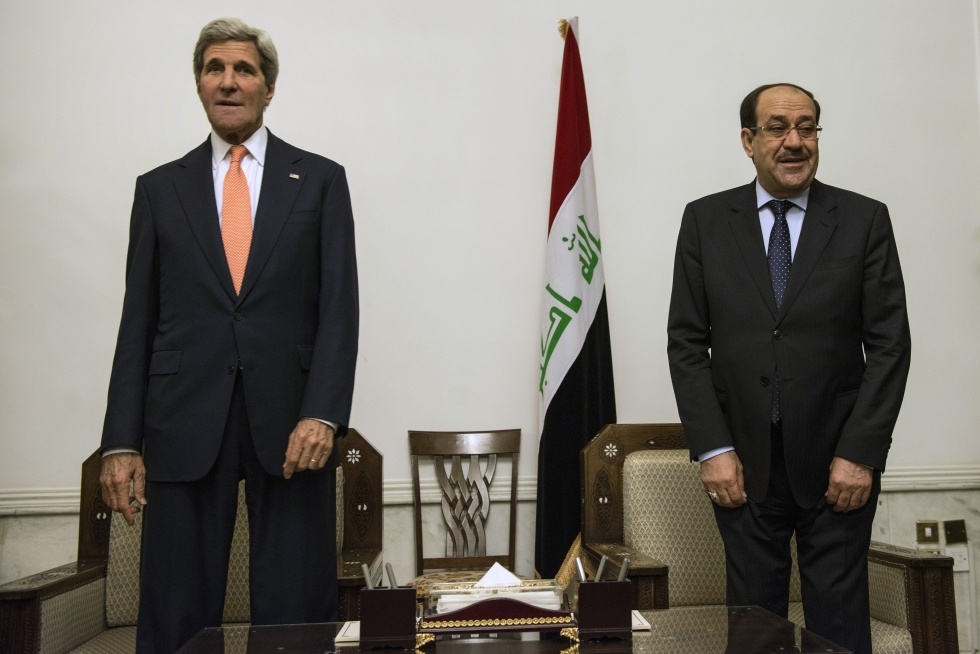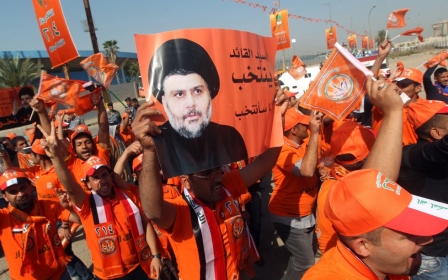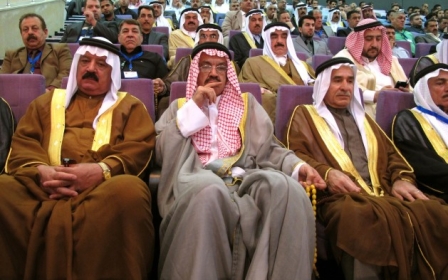Kerry: US will provide ‘intense’ support to Iraq as fighting rages on

The US will provide Iraq with "intense" support against militants that have launched a large-scale offensive in recent weeks, US Secretary of State John Kerry said on Monday.
Kerry made the comments during a surprise visit to Baghdad where he held talks with Iraqi Prime Minister Nuri al-Maliki and other Iraqi leaders and warned that the beleaguered country was facing an "existential threat."
The United States' "support will be intense, sustained, and if Iraq's leaders take the steps needed to bring the country together, it will be effective," Kerry told journalists in Baghdad.
A broad-based Sunni revolt, spearheaded by militant group Islamic State in Iraq and the Levant (ISIL), has seized control of vast swaths of the country, including Iraq’s second city Mosul. The Iraqi army has launched a counter offensive but has thus far not succeeded in rolling back the offensive which has continued to make gains.
"It is a moment of decision for Iraq's leaders," Kerry said. "Iraq faces an existential threat and Iraq's leaders have to meet that threat."
Kerry’s pledge of assistance comes as news broke that the Iraqi government had lost total control of its western front including the last border crossing into Syria, as well as a key border crossing into Jordan.
Anti-government forces also made gains in the north of the country, seizing the Shiite-majority northern town of Tal Afar and its airport, an official and witnesses said Monday.
"The town of Tal Afar and the airport... are completely under the control of the militants," the official told AFP on condition of anonymity.
Maliki's security spokesman Lieutenant General Qassem Atta also admitted on that "hundreds" of soldiers had been killed in the fighting which flared up on 9 June. The televised announcement is the most specific information received thus far about the extent of government losses.
Maliki was quick to stress the urgency of the crisis telling Kerry that uprising "represents a threat not only to Iraq but to regional and international peace," his office said in a statement.
The US has already sent 300 advisors and a small force to guard its embassy in Baghdad but the prospect of further assistance has been hotly debated in recent days.
Last week media reports emerged that US President Barack Obama would only consider a wider escalation in the form of air or drone strikes if Maliki stepped down. There has also been a growing chorus from US lawmakers on both sides of the isle, calling for Maliki to go.
"The Maliki government, candidly, has got to go if you want any reconciliation," US Sen. Dianne Feinstein, Democratic chairwoman of the Senate Intelligence Committee said on Wednesday.
Senator John McCain, a Republican who has long blasted Obama for withdrawing from Iraq too early and undermining the US military surge that many credit with helping turn the tide in Iraq, also reportedly told Obama that he must "make [it] very clear to Maliki that his time is up."
Maliki has long been criticised for practicing sectarian politics and moving to disenfranchise Iraq’s Sunni minority which has formed the backbone of the backlash against Baghdad.
Washington has now called on other Arab states to bring pressure on Iraq's leaders to speed up government formation, which has made little headway since April elections, and has tried to convince them ISIL poses as much of a threat to them as to Iraq.
Kerry warned all countries, particularly in the Gulf, that "there is no safety margin whatsoever in funding a group like ISIL."
"The United States would like to see the Iraqi people find leadership that is prepared to represent all of the people of Iraq," Kerry told reporters in Cairo on Sunday.
New MEE newsletter: Jerusalem Dispatch
Sign up to get the latest insights and analysis on Israel-Palestine, alongside Turkey Unpacked and other MEE newsletters
Middle East Eye delivers independent and unrivalled coverage and analysis of the Middle East, North Africa and beyond. To learn more about republishing this content and the associated fees, please fill out this form. More about MEE can be found here.




